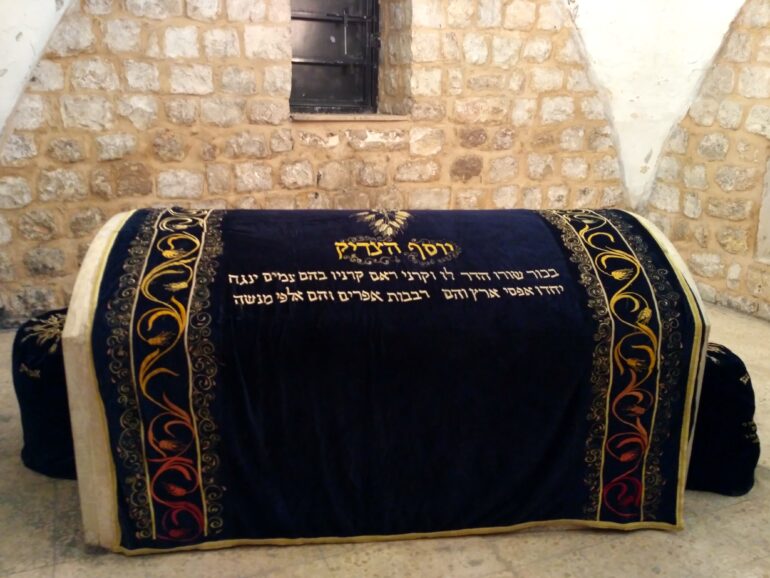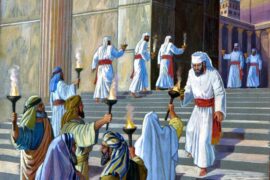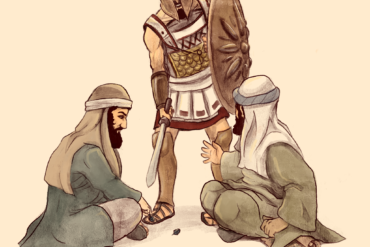Did Yosef import prophetic dreams to Egypt?
Were his intentions to correct or to abandon his father’s family?
If all Egypt knew of Yosef’s Hebrew (from Ever) identity, were his brothers aware of this too?
For more content from VISION Magazine, subscribe to our newsletter and follow us on Twitter @VISION_Mag_, Facebook and YouTube. If you haven’t already, don’t forget to subscribe to our podcast on SoundCloud, iTunes, Stitcher, TuneIn, or Spotify and leave a rating and review to help us get our message out to a wider audience!
To support the podcast, head over to our PayPal portal and be sure to write a note that your contribution is for the podcast.
Hosted by: Yehuda HaKohen
Transcript:
Parshat Mikeitz begins with the Egyptian Pharaoh dreaming two ominous dreams as Yosef ben Yaakov was languishing in a nearby prison.
Prophetic dreams hadn’t really been part of Egyptian culture and this might have actually been something Yosef had brought with him to the country. Yosef had of course dreamt prophetic dreams in his native land – dreams that were very important to him – and it seems that these dreams might have been somewhat contagious. As he came into contact with inmates in prison, they began to dream prophetic dreams and then when one of them was released and returned to serving Pharaoh, he also began to have prophetic dreams. But as a result of these dreams being alien to Egyptian society, no one was equipped to offer any satisfying interpretation.
Dreams represent aspirations – the desire for positive change. Egypt was a civilization that was completely enslaved to nature. The Egyptians even deified their water source. Egypt was a spiritually and morally stagnant society that placed stability as its highest value. But Yosef, the restless Hebrew dreamer who dreamt of fixing the world, brought his dreams with him to Egypt and ultimately infected the Egyptian ruling class with his contagious prophetic dreaming.
Towards the end of Parshat Vayeishev, we saw Yosef rise to the position of chief servant in the influential Egyptian Potiphar’s house. But after only a year in this position, Yosef was sent to prison for a crime he hadn’t committed. Potiphar’s wife had attempted to have an affair with the extraordinarily handsome Yosef but he resisted and she then accused him of trying to rape her.
This was actually a major event in Yosef’s narrative because succumbing to the advances of his master’s wife would have been extremely destructive for him. This event appears in the Torah immediately following the incident of Yehuda and Tamar that we addressed in our last episode. But a surface examination of these two stories seems to reveal that they teach us two completely different lessons.
In his situation with Potiphar’s wife, Yosef had completely resisted temptation. There’s a Midrash that suggests Yosef might have actually come to the house that day – when almost everyone else was away – with the intention of being intimate with Potiphar’s wife. But then he saw his father Yaakov’s face and realized the extent to which he would be betraying the values of his people. This threat of losing his identity was enough to pull him back from the edge.
Yehuda’s story with Tamar is presented to us very differently. He did transgress but later corrected himself. And the transgression itself is even understood as an important catalyst for his correction because for Yehuda, the transgression – while certainly problematic – doesn’t seem to have been as threatening as a similar sin would have been for Yosef.
In our previous episode we discussed the differences between Yehuda and Yosef as forces within Israel’s collective identity. Yosef represents that which Israel shares in common with other nations and is primarily concerned with the Jewish people’s material success and wellbeing. Yosef also desires a strong connection with the outside world and also desires to bring material benefit to humankind. Yehuda, on the other hand, represents what’s unique about Hebrew identity, what makes us different from other nations, and focuses on Israel’s spiritual message to the world.
Jews that are expressions of the Yosef force must generally be more vigilant than those who manifest the force of Yehuda when engaging the outside world because when engaging with gentiles, Yehuda tends to influence while Yosef tends to be influenced.
We can see a clear example of this in each tribe’s later relationship with the Phoenician kingdom in present day Lebanon. Melekh Shlomo ben David of the tribe of Yehuda had a very positive relationship with the Phoenician king Ḥiram. Ḥiram even made significant material contributions to the construction of the Jerusalem Temple. So here we see the tribe of Yehuda having a relationship with the Phoenician kingdom that advances our interests and national mission.
But Aḥav, a powerful Israeli king from the tribe of Ephraim – a sub tribe of Yosef – married Izevel, the princess of Phoenicia. This led to Phoenician idolatry becoming widespread in the kingdom of Israel and the prophets of HaShem becoming enemies of the state. Izevel actually used Hebrew soldiers in her crusade to kill our prophets. So here we see a clear example of a king from the house of Yosef having a relationship with the Phoenician kingdom that was extremely destructive for Israeli society.
In any case, Yosef was thrown in prison for a crime he didn’t commit. In the prison, his very powerful ḥen or charisma worked for him just as it had when he was a slave in Potiphar’s home. Just as Potiphar had liked and trusted Yosef enough to elevate him to the position of chief servant, essentially putting him in charge of everything he possessed, the head of the prison liked and trusted Yosef enough to place him in charge of the entire prison. And Yosef had already spent ten years in prison before he met Pharaoh’s royal baker and cup bearer and interpreted their dreams.
It’s also noteworthy to point out that he told his fellow inmates in B’reishit 40, verse 15, that he had been kidnapped from the “land of the Hebrews.” This shows that the Hebrews were a known ethnic group in ancient Egypt. And it also shows that there was a specific country already associated with the Hebrews. We actually also see this elsewhere in Yosef’s story. When Potiphar’s wife falsely accused him of trying to rape her, she referred to him twice as an Ivri – as a Hebrew. In B’reishit 39, verses 14 and 17. And in a conversation with Pharaoh in B’reishit 41, verse 12, the cup bearer – who had by then been released from prison – referred to Yosef as a naar Ivri – a Hebrew youth, further indicating that the Ivrim – the descendants of Ever – were a well known ethnic group in Egyptian society.
Yosef’s interpretations of his fellow inmates’ dreams were realized just as he had said. The baker was executed and the cup bearer was released and returned to his post. But it took another two years before he mentioned Yosef to Pharaoh. And only because Pharaoh had a dream in need of being interpreted.
But once Yosef was released and brought before Pharaoh, that same powerful ḥen – that same charisma that, combined with his self-confidence and talented mastery of the material world, had helped Yosef to advance to the top of pretty much every structure he entered – had its affect on Pharaoh. Yosef interpreted Pharaoh’s dreams as informing the ruler that Egypt would have seven years of plenty followed by seven years of famine. He was then essentially placed in charge of the entire kingdom – the most powerful kingdom of that era. At the age of thirty years old, after a year of slavery and twelve years in prison, Yosef had ostensibly reached the height of success. In many ways, we can see Yosef as the prototype for a very specific Jewish stereotype – the exceptionally talented “golden Jew” who powerful gentiles – from kings to mob bosses – trust to run their affairs.
Pharaoh gave Yosef a new name, Tzofnat-Paneaḥ, which means “revealer of the hidden,” and gave him Potiphar’s daughter Osnat as a wife. Our Sages make the point that Osnat was actually Potiphar’s adopted daughter and the Midrash even goes so far as to identify her as the child Yaakov’s daughter Dina conceived and gave birth to as a result of her being raped by the prince of Shkhem. Even if this isn’t meant to be taken literally, our Sages are still connecting the events at Shkhem with Yosef’s success in Egypt. What both share in common is a desire to forge a relationship between Israel and a gentile civilization in such a way that could advance the universalist aspect of the Hebrew mission.
In addition to being granted near unlimited power, Yosef was given the necessary material resources for implementing his radical program of nationalization, government planning and the restructuring of Egyptian society. Pharaoh was desperate to save his kingdom and trusted Yosef with completely undermining Egyptian stability through a revolutionary reorganizing of the entire economy. This may have caused resentment during the seven years of plenty. The Nile river overflowing each year and providing agricultural success was considered a law of nature. It may have been hard to understand why Pharaoh was trusting a foreign Hebrew to completely revolutionize society.
During the seven years of plenty, Yosef and Osnat had two sons. Yosef named his first son Menashe, saying that the Creator had made him forget – from the Hebrew root letters nun–shin–hei – the hardships of his father’s house. He then named his second son Ephraim because the Creator had made him fruitful in the land of his sufferings.
These names indicate that Yosef might have had a desire to forget his past and family so he could fully enjoy the success he was experiencing in his new home. In any case, Menashe would grow up to work with Yosef while Ephraim would focus more on studying the Torah, which could have only been the Oral Torah at this point in history. The fact that Yosef would invest in teaching his sons Torah shows that regardless of how he felt about his family and homeland, he was still loyal to the Hebrew mission as he understood it. And that his work on behalf of Egypt was likely his way of trying to implement that mission.
There are different opinions as to why Yosef didn’t send word to his father that he was still alive. One suggestion raised by Manitou – Rav Yehuda Ashkenazi – is that Yosef really did intend to break his connection with his family because he resented what his brothers had done to him and even considered his father at least partially responsible because he had sent him alone from Hebron to his brothers in Shkhem.
According to this approach, Yosef had attempted to transform Egypt, which was already the world’s major superpower, into a new Israel. There’s even a Midrash that during the years of famine, Yosef demanded that all Egyptians who came to him for food undergo circumcision. Even if this Midrash isn’t meant to be taken literally, it still teaches us something important about Yosef’s intentions.
At this point, Yosef appeared to have achieved tremendous success in Egypt. Not only materially but also spiritually to a certain extent because he had been engaged in using his power to educate the people of Egypt to higher ideals.
This is actually a very familiar story. Throughout history, Jewish leaders – especially those expressing the force of Yosef – tend to achieve success in foreign lands and often come to regard their Diaspora host country as some kind of new potential “light unto nations” that can be utilized to achieve the Hebrew mission if Jews properly invest in helping it reach its full potential.
We see this in Rav Shimshon Raphael Hirsch’s attitude towards Germany in the mid 19th century and we see it in the attitudes of many Jews in the United States, especially during the 20th century, but to a lesser extent even today.
Some US Jews living through the period of renewed Jewish independence in the Land of Israel have even argued that their ability to influence the world from the United States is greater than any Jewish influence from Israel. We hear these voices much less today than we once did, most likely due to the fact that the United States has been experiencing an obvious historic decline and most of its Jews have begun feeling a sense of uncertainty and insecurity regarding their future. All attempts to fulfill the Hebrew mission from the Diaspora must ultimately fail. This was the rejected path of Naḥor that we addressed in some of our previous episodes. Even Avraham, when he married Hagar, had thought it possible that the Hebrew mission could be realized through the mighty Egyptian kingdom adopting his spiritual message. But while this may have been a rejected path for Avraham and an unattained aspiration for Naḥor, Yosef actually appears to have been successful in practically achieving it.
According to the approach that Yosef sought to remain disconnected from his family, he did still feel connected to Binyamin, and feared that his younger brother was being mistreated by Leah’s sons in the same way that he had been. It’s possible that Yosef hadn’t yet appreciated what he might have contributed to the toxic family dynamic and still blamed his brothers for what he likely understood as one-sided abuse motivated by jealousy.
According to this approach, Yosef’s eventual reunion with his brothers will be just as much a correction for his shortcomings as for theirs.
Another perspective, however, offered by the Ramban, is that Yosef had ben focused on the realization of his prophetic dreams. He had already reached the heights of power in Egypt and he expected that his brothers would eventually show up. According to this approach, Yosef was still motivated by the same desire to reeducate and correct his brothers that he had felt in his youth, in order that they could best realize their potential as the nation of Israel. Alerting his family to the fact that he was alive and ruling Egypt would most likely undermine his ability to accomplish this.
When the famine reached the Land of the Hebrews, ten of Yosef’s eleven brothers – all but Binyamin – ultimately did arrive in Egypt looking for grain. If we understand Yosef to have until now been waiting for this moment, the opportunity now presented itself to implement his plan. If we understand Yosef to have wanted to forget his past and disconnect from his father’s clan, we can say that the arrival of his brothers suddenly forced him to confront his past, while also presenting an opportunity to “rescue” Binyamin. What might actually make most sense for us is to understand Yosef as having simultaneously held both of these attitudes while experiencing years of internal conflict between them. In any case, once his brothers arrived, he had to begin resolving this.
Yosef hid his identity and used his son Menashe as an interpreter so the Hebrews wouldn’t know he understood their language. But Manitou suggests that it’s likely the sons fo Yaakov knew Tzofnat-Paneaḥ to have been a Hebrew. Not from the family of Avraham but a descendent of Ever. If it was common knowledge in Egypt that the viceroy was a Hebrew, it’s unlikely that Yaakov’s family wouldn’t have known this.
The people of Israel recognize four basic stages of tshuva. The first is acknowledging a transgression. The second is the emotional turmoil experienced from having committed the acknowledged transgression. The third is correcting the actual consequence of the sin. And the fourth is avoiding similar acts in the future.
Yosef had planned to lead his brothers through all four stages in order to ensure that their tshuva be deep and complete. Had he revealed his identity too early and Yaakov’s sons had found themselves at the mercy of their dejected brother, he would not have been able to properly orchestrate this process because although he would have been able to coerce them physically, he would have no power over their inner selves. Yosef had to restrain himself with all his strength, in order to hide his identity and see his plan through to ensure that the tshuva of his brothers would be genuine and not motivated by their fear. They had to each experience a real internal transformation.
Yosef accused his brothers of being spies and had them incarcerated. If the highest value in Egypt was stability, then it would be legitimate to presume their guilt and arrest them without evidence in the name of security, or as Yosef expressed it in B’reishit 42, verses 15 and 16 “by Pharaoh’s life.”
But after three days he released them from the prison, claiming in verse 18 to fear the Creator. If his worldview didn’t actually prioritize state security but rather loyalty to higher values, he couldn’t rob human beings of their freedom merely due to a suspicion of guilt.
This was actually part of his brothers’ reeducation process. They might have had valid reasons to see the seventeen year old Yosef as a threat, but they didn’t have any evidence. And they acted against him preemptively based on only their suspicions. By releasing them from prison after three days and communicating that it would be wrong for him to incarcerate them for espionage without proof, Yosef was successful in subtly reminding them of their earlier crime against him.
The brothers immediately made the connection between their plight and what they had done to Yosef. This is clearly expressed in B’reishit 42, verse 21. And in verse 22, we even see an “I told you so” from Reuven – who had actually stopped Shimon and Levi from killing Yosef but wasn’t around to stop him from being sold. When Yosef witnessed his brothers’ genuine remorse and acknowledgement for the wrongs they had committed against him, he turned away so they wouldn’t see him weep. This was the first stage of their tshuva.
Yosef then rearrested Shimon, likely the most dangerous of the brothers, and sent the rest home to their father. If they hoped to see Shimon again, they were told that they would need to return with Binyamin to corroborate the story they told him. On their way back to their land, however, the brothers discovered that they had both the grain they had purchased and their money – which Yosef had ordered be returned to their bags.
Now that they saw actual evidence against them, verse 28 says “their hearts sank and they turned trembling to each other.” They were now experiencing the second stage of tshuva – emotional turmoil – and recognizing, as the rest of verse 28 states, that the Creator was behind all that was happening to them.
When Yaakov saw that his sons had returned without Shimon but still had their money and the grain, he might have suspected that they had sold Shimon into slavery. It would seem fitting that although they had successfully avoided their father’s suspicion for selling Yosef for so many years, Yaakov’s sons may have at this point been accused of selling a brother they hadn’t sold.
In any case, Yaakov refused to allow Binyamin to be taken down to Egypt. Even when Yaakov’s consistently well-meaning but not too sharp oldest son Reuven offered that Yaakov could kill his two sons – Yaakov’s own grandsons – if anything were to happen to Binyamin, the Hebrew patriarch refused. But once the famine grew more severe and they were once again in need of grain, Yaakov again tried to send his sons back to Egypt.
At this point, Yehuda stepped up and managed to convince his father to send Binyamin with them. He offered Yaakov no material guarantees but his words expressed a deep sense of family unity and mutual responsibility. Perhaps the fact that Yehuda had lost two sons of his own forced Yaakov to take him seriously. Or perhaps it was just that the famine had made them all desperate. But from this point on, Yehuda was restored to his rightful place of leadership within the clan.
When the sons of Yaakov arrived back in Egypt, Yosef saw that Binyamin was with them and invited them to dine together with him in his home – something highly unusual, especially under the circumstances surrounding their last visit. The brothers immediate rushed to clear up the matter of the money in their bags, which didn’t seem to be an issue. They were also reunited with Shimon, who was now free to join them. But they still had concerns that Tzofnat-Paneaḥ might have been luring them into some kind of trap away from the public eye.
Once inside Tzofnat-Paneaḥ’s residence, B’reishit 43, verse 32 tells us that the Hebrews and Egyptians dined separately because it was abhorrent for the Egyptians to dine with Hebrews. According to Onkolos, this was because Hebrews herded and ate animals that Egyptians had deified as gods.
We also see here again that the Ivrim – the Hebrews – were a recognized ethnic group at that time that included more people than just the family of Avraham. And the fact that Tzofnat-Paneaḥ was dining together with the Hebrews and not the Egyptians shows that Yaakov’s sons likely knew him to be a Hebrew but just didn’t yet realize that he was Yosef.
It’s also worth noting that many Egyptians likely found it offensive that a Hebrew had become viceroy of Egypt, an agricultural civilization that detesting shepherds. Tzofnat-Paneaḥ might have been Egypt’s great savior, but he likely remained a social outsider to much of Egyptian society.
Yosef astonished his brothers by seating them in age order, from eldest to youngest. According to Rashi, he pretended to know their age order through use of his silver goblet. He then seated Binyamin next to himself and made sure to give him extra attention and extra portions of food in an effort to see if the other brothers would become jealous.
We already mentioned the four stages of tshuva. The last of these stages is to avoid repeating the same transgression when in a similar situation. Yosef therefore needed to test them at this meal. He needed to see if any signs of resentment or jealousy towards Binyamin would emerge when they were drunk and their guard was down.
But there was also a further level to this final stage of tshuva. Yosef wanted to recreate the conditions for what had happened to him as much as he possibly could so that his brothers could effectively complete their process of correction.
The first part of this required Binyamin’s presence because – like Yosef – Binyamin was a son of Raḥel, who the sons of Leah might have been predisposed to resent due to the complicated history of family dynamics we’ve already covered in previous episodes.
Next, Yosef needed to show open favoritism to Binyamin. Just as Yosef himself had once been treated as his father’s favorite son, Binyamin had to be seen as the recipient of overt favoritism from their powerful and unpredictable host. Binyamin was given the best dishes and a much larger portion of food.
But the third part of this was creating a situation in which Binyamin was framed as a thief and his brothers were made to feel pressured to abandon him. Yosef therefore had his silver goblet placed in Binyamin’s bag.
The next day, as the sons of Israel were preparing to travel home, they were stopped and accused of stealing the viceroy’s goblet. They denied it but their bags were searched from Reuven to Binyamin, where the goblet was ultimately found. The others were then permitted to go free but told that Binyamin must remain in Egypt as a slave. Yosef created a situation in which his brothers could either sell Binyamin out or stand up for him. And under Yehuda’s leadership, the sons of Israel did in fact refuse to abandon Binyamin, preferring a confrontation with the ruler of Egypt if necessary.





